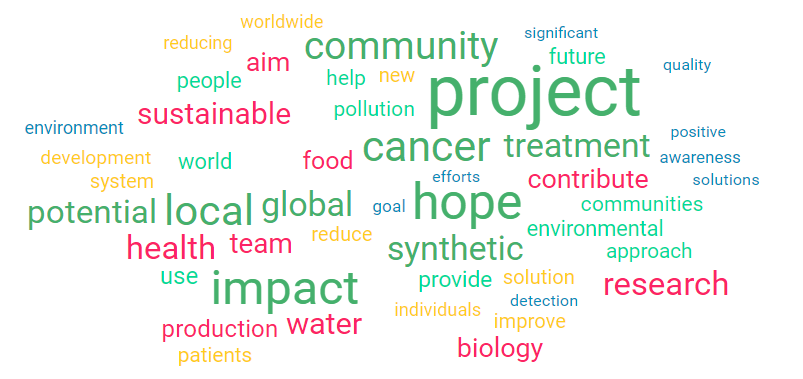Empowering Youth to make an Impact in the World with Synthetic Biology
Since 2021, with the support from Frederick Gardner Cottrell Foundation, we launched the Impact Grant initiative to help iGEM teams take their projects further than ever before. The goal of the Impact Grant is to support outstanding teams that are building upon the past of synthetic biology to create the future of the field. Teams that participate in the iGEM Competition are pioneers of synthetic biology, and these grants empower teams to secure funding for impactful projects in responding to climate change and biodiversity loss, enhancing human health, improving agriculture production and food security, scaling up the sustainable industrial production, and many other critical challenges. Here are just a few examples of the 2022 Impact Grant recipient teams:
Africa
Edinburgh-UHAS_Ghana (Ghana) created a cell-free biodegradation tool for PET pollution and a bioremediation device for sequestering heavy metals along with a cell-free biosensor to detect heavy metals (mercury, lead, cadmium and arsenic) to locate the acutely affected areas of heavy metal pollution. Nominated for Best Environment Project, Gold Medalist, Undergrad Division.
Asia
Seoul_Korea (South Korea) created an Eco-friendly and biodegradable oil absorbent using synthetic biology. High School Top Ten, Best Integrated Human Practices, Gold Medalist, High School Division.
Europe
Freiburg (Germany) tidied up bacterial cells with natural and engineered nano compartments. The project laid the foundations for using compartmentalization as a tool to exploit the full power of bacterial cells. Best Foundational Advance Project, Gold Medalist, Overgrad Division.
Latin America
TecCCM (Mexico) aimed to measure the ratio between 3 proinflammatory markers (CRP, TNF-a & CXCL9) and an anti-inflammatory marker (IL-10). The project has developed a PoC biosensor that consists of a multiplex lateral flow assay for easy semi quantitative results. Gold Medalist, Undergrad Division.
North America
William and Mary (United States) designed a predictive model using multivariate regression and neural networks to help scientists with chassis selection for soil, water, air, and the gut microbiome. Best Software & AI Project, Gold Medalist, Undergrad Division.
Based on the last two years’ success, we continued the Impact Grant program for the 2023 season. We updated the rubric for selecting teams to better assess how their projects fit within synthetic biology and how the teams see the wider role of synthetic biology in their part of the world. Among other criteria, we asked teams to identify the economic, social and environmental needs related to their targeting challenges in measurable ways. We also asked teams to consider how their work fits with what has already been done in the field of synthetic biology, what impact solving the challenge would have in the future, and how this award would help the team reach their goals this year.
After reviewing 240 applications from teams in more than 33 countries, we selected 90 iGEM teams with projects that are impactful and technically ambitious (but achievable), with an eye towards teams who are building on the work of the synthetic biology community and have thought deeply about where they could take their project next.
Click here to see the full list of the 90 recipients of the 2023 Team Impact Grant
Impact Grant Applicants
Grant Allocation by Village
Grant Allocation by Region
Among the 2023 teams, we saw several common themes
Tackling Local Problems
Most teams are tackling local but common problems, such as water, the environment, and health, and are oriented towards addressing the challenges that surround daily life.
Meeting People’s Needs
Most teams prioritized the needs of the local people in their communities, and described the scientific, economic, social, and environmental motivation behind their projects.
Making Impacts in the Local Community and the World
While most teams aim to make an impact in their local community, they are also seeking to extend the influence of their project to the world in addressing the environment, disease treatment, health, food and other pressing issues of today.
Impact beyond the Competition
The goal of most teams is to apply their research in the industry, bringing real products to the market. Some teams also hope to publish their research in academic journals.
We were amazed at the dedication, talent and focus shown by the 2023 teams, and can’t wait until the Grand Jamboree to see what they’ve accomplished!
About the Frederick Gardner Cottrell Foundation
Research Corporation Technologies established the Frederick Gardner Cottrell Foundation in December 1998 to provide financial support for scientific research and educational programs at qualified nonprofit organizations. Since its formation, the foundation has provided over $50 million in support of selected scientific and educational programs throughout the United States.
Interested in becoming a sponsor?
Contact us at sponsor@igem.org or book a meeting to learn more about sponsorship opportunities.
















